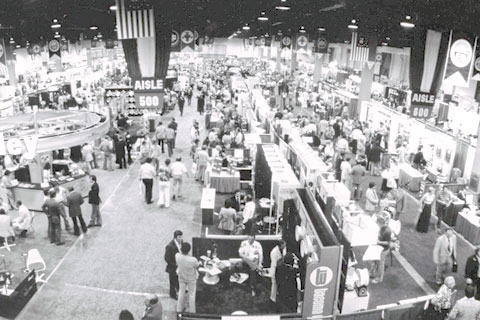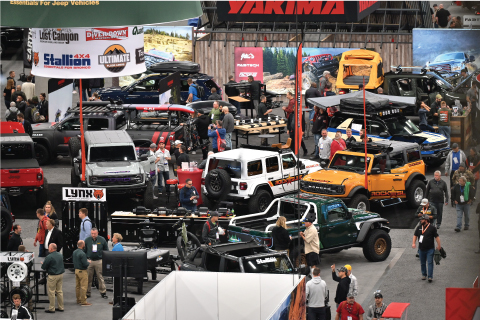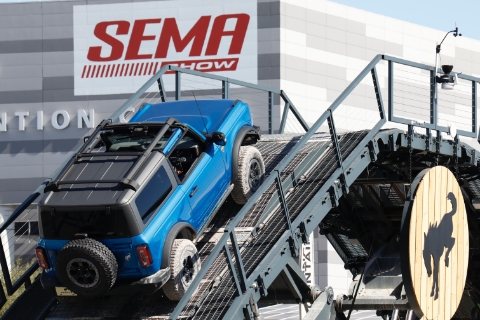SEMA News—March 2011
Fresh Data Confirms Pros’ Views: Accessories Influence New-Car Sales
|
|
|
The study looked at the persuasive effects created by accessory products, including which ones are likely to create the greatest influence. It delves into which vehicle types are more likely to be purchased based on product availability. The data also provide information about the influence customized vehicles have on the decision to purchase new vehicles by a range of different consumers, including those who do not normally modify their cars or trucks as well as those who do and, in some cases, those who are most zealous about customization. It also examines consumers’ perceptions of specialty-equipment products versus OEM aftermarket products.
The report is now available free for download by SEMA members ($199 for non-members), and it confirms what those involved in new-car sales, vehicle dealerships and the customization of new vehicles have understood for years: Accessories help sell new vehicles. In recent interviews, professionals in all three camps provided independent commentary that supported the assertions found in the study.
“The idea behind personalized display cars is that people see things they haven’t seen anywhere else when they walk into the showroom,” said Beau Boeckmann, vice president of the Galpin Ford dealership in North Hills, California. Boeckmann is also president of Galpin Premier Collection, a dealership for Aston Martin, Jaguar, Lotus, Volvo, Lincoln and Mazda, and Galpin Auto Sports LLC, a specialty-equipment business with an extensive inventory of both performance and cosmetic accessories. “We’re well known for our customized vehicles,” Boeckmann said.
“A customer doesn’t have to design his own car; it’s already right there. He falls in love with it and—boom—he buys it. We’ve sold many vehicles that way. We’ve earned a reputation over the decades of having things that are different at Galpin.”
Source of Product Information—Internet Tops List
| How do you generally find out about aftermarket products? | Total | Modified | Plan to Modify | Zealots | Enthusiasts | Participants |
| Internet | 61% | 60% | 66% | 70% | 67% | 42% |
| Saw It on Another Vehicle | 34% | 35% | 25% | 43% | 37% | 30% |
| Friend or Relative | 32% | 32% | 32% | 31% | 31% | 56% |
| Magazine Advertisement | 24% | 24% | 20% | 37% | 32% | 7% |
| Magazine/Newspaper Article | 24% | 25% | 15% | 33% | 28% | 10% |
| Product Brochure | 15% | 15% | 15% | 15% | 14% | 17% |
| Auto Show | 11% | 11% | 9% | 17% | 13% | 0% |
| TV Advertising | 11% | 11% | 10% | 7% | 10% | 12% |
| Direct Mail Advertising | 9% | 8% | 13% | 16% | 6% | 5% |
| Mentioned in Article | 9% | 8% | 12% | 17% | 7% | 1% |
| Newspaper Advertisement | 8% | 8% | 9% | 6% | 7% | 10% |
| SPEED Channel | 7% | 8% | 3% | 10% | 9% | 0% |
| Auto Club Events | 5% | 6% | 4% | 8% | 6% | 0% |
| Other Events/Promo | 5% | 6% | 1% | 7% | 7% | 0% |
| Radio Advertising | 5% | 5% | 4% | 5% | 5% | 6% |
| Auto Races | 4% | 5% | 1% | 6% | 5% | 0% |
|
AutoPacific Authoritative Automotive Research & Insight
|
||||||
The SEMA/AutoPacific study supports Boeckmann’s views regarding accessorization and display vehicles. It was conducted using input from three distinct groups. First, was an Internet survey of consumers who either already had modified or planned to modify their newer-model (’07–’11) vehicles. A second Internet survey concentrated on consumers who had not modified their vehicles as well as those who may have been influenced by customized vehicles during their purchase decision even though they had chosen not to modify. The third consisted of telephone interviews with supervising personnel for eight major OEMs, including managers and directors of product planning, parts and accessories operations, accessory planning and consumer relations.
As with many industries, the automotive market suffered a decline over the past few years when the recession created a climate of wariness among consumers. In 2007, for instance, as many as 23% of consumers performed some type of modification to their vehicles. By the time the survey was carried out, that number had fallen to 14%, though, it may begin to rise again as the economy rebounds. Thus, the survey concluded, companies wishing to sell accessories to new-car buyers need to target and market to the core automotive enthusiast or help create interest at the time of purchase when consumers are most likely to be influenced.
 |
|
Ray Ott, director of operations for Auto Trim Design of Cleveland, a restyling and accessory installation business, said that a dealership may sometimes need to go outside its own inventory to please a customer and, in the process, build a reputation for accommodating and delivering on specific requests.
“A dealership supports its manufacturers’ parts programs first, of course,” he said. “For instance, the Ford group we work with has its own accessories, and their auto parts warehouse distributor also promotes its accessory lines. But if the customer wants a specific product—a particular tonneau cover or whatever—the dealership will want to get it for him or her. If it’s a brand name that a company such as Myers Distributing or Keystone carries, it’s an easy request to fulfill.”
Modifications—Top Half
| What type of modification(s) did you do/plan to do to your vehicle? | Total | Modified | Plan to Modify | Zealots | Enthusiasts | Participants |
| Different Tires | 30% | 32% | 17% | 37% | 39% | 15% |
| Different Wheels | 16% | 16% | 19% | 25% | 25% | 2% |
| Audio Upgrade System | 16% | 15% | 20% | 21% | 19% | 5% |
| Navigation System | 16% | 16% | 15% | 19% | 20% | 1% |
| Satellite Radio | 15% | 14% | 19% | 14% | 14% | 2% |
| Air and Fuel Delivery | 13% | 14% | 8% | 28% | 14% | 0% |
| Upholstery/Trim | 11% | 12% | 6% | 11% | 12% | 5% |
| Accessories and Fluids | 10% | 11% | 5% | 13% | 14% | 9% |
| Electrical, Lighting and Body | 10% | 11% | 7% | 13% | 16% | 0% |
| Paint/Graphics | 10% | 10% | 11% | 8% | 13% | 4% |
| Wiper and Washer | 10% | 11% | 6% | 11% | 12% | 11% |
| Exhaust | 9% | 9% | 12% | 20% | 9% | 0% |
| Exhaust System Upgrade | 9% | 10% | 6% | 23% | 10% | 0% |
| DVD/Game System | 9% | 8% | 14% | 8% | 11% | 9% |
| Roof Rack | 9% | 8% | 15% | 5% | 8% | 4% |
| Body | 9% | 10% | 3% | 12% | 10% | 12% |
| Engine/Performance Upgrade | 8% | 9% | 6% | 19% | 9% | 6% |
| Grille | 8% | 8% | 11% | 12% | 7% | 0% |
| Ground Effects/Spoiler | 8% | 7% | 13% | 8% | 10% | 1% |
|
AutoPacific Authoritative Automotive Research & Insight
|
||||||
The survey points out that simply seeing modified vehicles influences many consumers, which is all the more reason for dealerships to display one or more of them on the lot or in the showroom to attract traffic. And many consumers consult enthusiasts about both vehicles and accessories, viewing them as experts. Vehicle owners who choose to personalize their cars and trucks often have large spheres of influence with other consumers.
“That is really how my dad built Galpin Ford,” Boeckmann said, “and it’s also how we look at building Galpin Auto Sports. Word of mouth is the best advertising there is. We want to make our customers enthusiastic fans of the dealership and the accessories store. The most important thing we can do is make them so happy that they want to come back, bring their friends and refer people to us.”
 |
|
Tony Hinton is general manager of Auto Trim of Denver, a restyling shop and accessory installation business that works strictly with dealerships and does not offer retail services. He said that virtually all of the 150 or so dealerships his company works with each month carry an assortment of accessories.
“They may use different vendors for products other than those we install,” he said, “but we work hand in hand with those other vendors where we need to if the dealership wants to put together a complete package. We might install one or two of our items on an SUV or a pickup—maybe leather, navigation, mobile video—and then incorporate running boards or nerf bars from another vendor. But we try to facilitate all of that activity.”
|
|
|
Second is actually seeing parts on a vehicle, third is friends or relatives and fourth is magazine ads or articles. Since it is impractical to have display vehicles showing all possible modifications, many accessory businesses are using the Internet as a key marketing tool in collaboration with their dealership clients.
“Our website, www.voguetire.com, has a build-a-car feature on it that allows dealerships and their customers to see different looks,” said Kevin Goyak, executive vice president of Vogue Tyre and Rubber Company. Vogue offers not only a range of tires and wheels, but also easily installed accessories, such as grilles, body kits and spoilers, to more than 500 dealerships each month. “We also use catalogs that are individualized by brand,” Goyak said. “They include all of the products we offer as well as price sheets. We can also custom-make a catalog with the dealership’s name on it. Our salespeople go in with everything they need to make a good sales call.”
The survey said that tires and wheels remain the most-sought modification, followed by audio and navigation. The majority of consumers who personalize their vehicles have someone else do the installation, though, experienced enthusiasts are more inclined to do the work themselves.
“Tires and wheels are the easiest things to change on a car, and they’re easy for a dealership to handle,” Goyak said. “The next item for our dealerships is usually a grille, which is still a big part of our business.”
Ott said that regional factors can also play a part in what sells and what dealerships are likely to concentrate on. “Up here in Ohio, we see a lot of truck accessories—tonneaus, vent visors, bug shields—and we also do a lot of graphics. Remote starts are also big here in the cold region.”
Influences to Modify Vehicle
- Adding a feature or functionality that the vehicle did not come with is the number-one reason that would influence non-modifiers to modify their vehicles.
- Those that were influenced would have a higher likelihood to modify if the accessories were available at the time of vehicle purchase.
| What would influence you to modify your vehicle? | Non-Modifiers | Not Influenced | Influenced by Customized Vehicle |
| Add Functionality/Features Not Offered by the Factory | 47% | 47% | 41% |
| Guarantee Not to Void Factory Warranty | 33% | 33% | 35% |
| Accessories Presented/Offered at Time of Vehicle Purchase | 32% | 31% | 38% |
| Personalize Styling to My Individual Taste | 20% | 19% | 32% |
| Able to Include in Monthly Vehicle Payment | 14% | 14% | 19% |
| Other | 16% | 16% | 7% |
| Source: AutoPacific Authoritative Automotive Research & Insight | |||
The AutoPacific data looked at the advantages and disadvantages that consumers cited when having accessories installed through a dealership as opposed to a retail store. The survey respondents felt that the greatest benefits of working with a dealership were that the modifications could be completed before the vehicle was delivered using OEM parts that carried the factory warranty. On the retail side, consumers cited better pricing and the perception that the installers were specialists who possessed greater expertise than a dealership might offer, and they also said that aftermarket retailers offer higher-quality products. Goyak pointed out that financing also plays a part in making accessory sales more attractive through a dealership. The customer can roll the cost of modifications into the purchase price of the vehicle and add only a relatively small amount to the monthly payment.
“Financing has finally loosened up,” Goyak said. “The last two years have obviously been a challenge, but dealers are now more excited about being in business. That is definitely looking brighter.”
One-third of people say they would be influenced to modify their car, if they were guaranteed not to void the factory warranty, and all of the industry professionals we spoke with agreed that alleviating warranty concerns is crucial to their partnerships with new-car dealers.
 |
|
Goyak said that everything his company sells must meet or exceed the factory warranty on the vehicle, so Vogue matches the OEM warranty, and Boeckmann said that warranty plays a large part in which specialty-equipment manufacturers the Galpin businesses deal with.
“Most not only warranty their own part, but also other parts that might be affected if there were a problem,” he said. “The reason we’re in business is to give confidence to customers. If a customer has a problem with one of our installations, we’re going to take care of it for him.”
Even consumers who might not be inclined to personalize a vehicle’s looks or performance might consider adding a feature or function that didn’t come on the vehicle from the factory, according to the survey. Consumers were also more likely to make those types of modifications at the time they purchased a car or truck.
“We go after vehicles and trim levels where our product would seem to fit,” Hinton said. “In many cases, for instance, ordering a factory navigation system may require the customer to upgrade to an expensive package or a high-end trim level. But the customer may not want bigger wheels, a bigger engine, certain trim additions. All he wants is navigation. We are able to provide that kind of product à la carte to satisfy that particular customer’s demand.”
The largest accessory influence on consumers shopping for new cars or trucks came from customized vehicles on display in the showroom, followed by seeing personalized cars or trucks on the road and vehicle brochures.
“A display car often gets the customer’s appetite working,” said Boeckmann. “They’ll buy a car that has upgraded wheels at the dealership but then drive it across the street to the accessory store and get a body kit and an exhaust and other performance parts. It becomes like a hobby to a lot of people. That’s a lot of fun, and that’s the whole key to it. We try to make it fun for our customers.”
The SEMA/AutoPacific survey makes it clear that the availability of accessories has a positive influence on new-car sales. In the next issue of SEMA News, we’ll look at some of the other data from the perspective of new-car dealerships and OEM strategies regarding accessorization.





